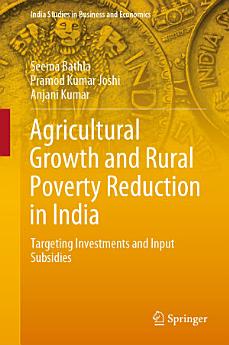Agricultural Growth and Rural Poverty Reduction in India: Targeting Investments and Input Subsidies
About this ebook
Ratings and reviews
- Flag inappropriate
About the author
Seema Bathla is a Professor, CSRD, JNU, New Delhi. Before joining the JNU, she worked at the Institute of Economic Growth, The Energy Research Institute and Delhi University. She obtained her M.Phil. from Delhi School of Economics and her Ph.D. from the JNU. She has 27 years of work experience and has published four books (three co-authored) and more than 45 research articles in refereed national and international journals. With a keen interest in agricultural issues, she has conducted several studies and undertaken assignments for the World Bank, IFPRI, UNCTAD, WWF-India, and IASRI. She was conferred the Jawaharlal Nehru Award for Outstanding Postgraduate Agricultural Research by the Indian Council of Agriculture Research, New Delhi, in 2008. She is also the recipient of the Dr. R.T. Doshi award for best paper published in Agricultural Economics Research Review in 2014 and 2015, and the Dr. A K Sen award for the best book published in 2018.
Pramod K. Joshi is a former Director for South Asia at the International Food Policy Research Institute, New Delhi. He has also served as Director of the National Academy of Agricultural Research Management, Hyderabad, India; Director of the National Centre for Agricultural Economics and Policy Research, New Delhi; South Asia Coordinator at the International Food Policy Research Institute; and a Senior Economist at the International Crops Research Institute for the Semi-Arid Tropics in Patancheru. His research areas include technology policy, market, and institutional economics.
Anjani Kumar is a Research Fellow at the International Food Policy Research Institute, New Delhi. Before joining the IFPRI, he was a Principal Scientist (Agricultural Economics) at the International Crops Research Institute for the Semi-Arid Tropics, Hyderabad. He has also served as a Principal Scientist at the National Centre for Agricultural Economics and Policy Research, New Delhi; a Senior Agricultural Economist at the Asia Office of the International Livestock Research Institute, Nairobi; and a Consultant for a number of national and international institutions including the FAO, World Bank, IFPRI, National Agricultural Cooperative Marketing Federation of India (NAFED), and the Department of Science and Technology (DST), Government of India. Having written over 70 research papers and more than 50 book chapters, he is a Fellow of the National Academy of Agricultural Sciences of India and has won numerous national and international awards.




